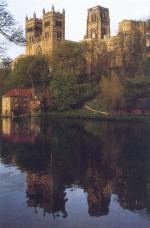
The LMS-EPSRC Durham Research Symposia began in 1974, and form an established series of international research meetings, with over 100 symposia to date. They provide an excellent opportunity to explore an area of research in depth, to learn of new developments, and to instigate links between different branches. The format is designed to allow substantial time for interaction and research. The meetings are held in July and August, usually lasting for 10 days, with up to 70 participants, roughly half of whom will come from the UK. Lectures and seminars take place in the Department of Mathematical Sciences, Durham University.

This symposium will explore the mathematical problems associated with Maxwell's equations in several modern application areas:
1) Photonics and Resonances: This looks at the propagation of electromagnetic waves in periodic structures. Mathematical questions include the study of affects on the spectrum of the underlying operator resulting from the geometry or strength of perturbations to the periodic structure.
2) Metamaterials and Cloaking: Metamaterials are usually constructed by using repeated microscopic structures to achieve properties not observed in natural materials. These properties are usually achieved in some abnormal regimes, which can only be approximated in actual production processes. This provides difficult mathematical problems, such as analysing the rate of convergence of various approximations and defining the optimal way to approximate. Mathematical techniques include homogenization theory.
3) Inverse Problems in Electromagnetism: Many (medical) imaging techniques make use of electromagnetic waves. Recently, there has been much interest in so called mixed mode or hybrid imaging. Mathematical questions include: unique reconstruction of the image, development of reconstruction algorithms and reconstruction in the presence of incomplete data. One tool used successfully in this area has been harmonic analysis.
An additional focus will be the interface between analytical questions for Maxwell systems and results obtained using numerical methods, in particular novel numerical techniques based on new mathematical analysis, e.g. multiscale methods which exploit ideas from homogenization, special methods which capture geometric and high-energy asymptotics, as well as the use of verified computations as a constituent tool in a formal analytical proof.
There are some funds available to support UK graduate students attending the symposium. For more information, please contact Ian Wood.
Note: The scientific programme will start on the morning of July 12th and finish in the afternoon of July 20th.

Useful information about travelling to Durham can be found on the Department of Mathematical Sciences and Durham University webpages.

Accommodation for participants will be in Grey College. Guest rooms offer en-suite and internet facilities. Attendance is by invitation only and fees for self-supporting participants are payable by cash, credit card, sterling cheques or sterling travellers cheques at registration.


